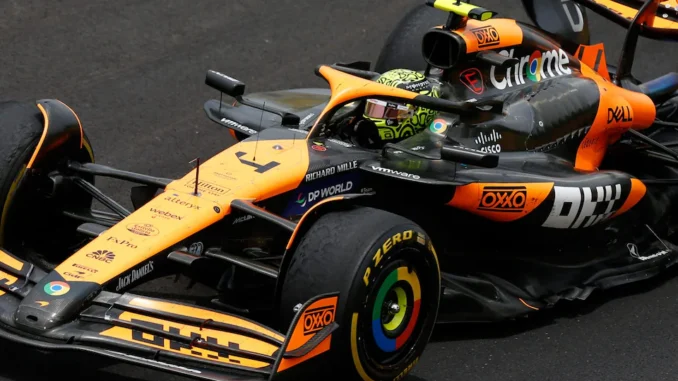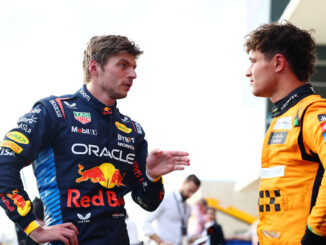
**Red Bull Accuses McLaren of Rule-Bending: The Water-Filled Tire Allegation in F1**
The Formula 1 paddock is no stranger to controversy, but Red Bull’s recent allegations against McLaren have taken things to a new level. Ahead of the Brazilian Grand Prix, Red Bull alleged that McLaren might be engaging in unsanctioned practices by filling their tires with water. This claim, which McLaren adamantly denies, could have major implications, not just for the team standings but for the integrity of the sport. With championship points and reputations on the line, the racing world is watching closely to see how this drama unfolds.
### The Background of the Allegation
In Formula 1, where every fraction of a second counts, teams constantly search for ways to push the boundaries of what’s allowed under the regulations. This high-stakes environment has seen multiple instances of innovation, and sometimes controversy, over the years. Red Bull’s allegation that McLaren might have filled their tires with water is based on suspicions regarding McLaren’s recent tire performance under hot conditions. While unconfirmed, Red Bull claims that by adding water to the tires, McLaren could potentially control tire temperatures more effectively, giving them a considerable edge in managing wear and preserving performance throughout a race.
This allegation isn’t entirely without context. Rumors had circulated earlier in the season about certain teams using creative tactics to optimize tire performance, particularly when temperatures soar. Tire temperature management is crucial in Formula 1 because excessive heat degrades tires quickly, impacting grip, speed, and fuel efficiency. If McLaren were able to manipulate this by introducing water into their tires—a tactic never before seen in Formula 1—it would grant them a significant, potentially game-changing advantage.
### How Water in Tires Could Work as a Strategy
To understand why this accusation is causing such an uproar, it’s essential to grasp how water could affect tire performance. When water is introduced into tires, it could theoretically function as a thermal stabilizer. Water, with its high heat capacity, absorbs and retains heat more efficiently than air, which is typically used to fill F1 tires. In a race situation, this would allow the tires to heat up more gradually and cool down faster, keeping the rubber at a more consistent operating temperature. Such stability could improve tire life, enhance grip, and optimize overall performance, especially on tracks where heat poses a constant threat to tire durability.
Red Bull contends that this alleged technique may have contributed to McLaren’s recent surge in competitive performance. While Red Bull’s drivers, including Max Verstappen, have voiced frustrations over struggling with tire degradation in certain races, McLaren appears to have found a way to prolong tire life, allowing for more aggressive strategies. The benefits of such an approach could extend beyond tire preservation; it could lead to better fuel efficiency, improved lap times, and a stronger showing in crucial segments of each race.
### McLaren’s Response: Denial and Counter-Claims
In response to the accusations, McLaren has issued a firm denial, dismissing the claims as baseless and unfounded. The team’s official statement underscores their adherence to all FIA regulations concerning tire protocols and asserts that any allegations suggesting otherwise are speculative at best. McLaren further stated that these accusations detract from the team’s hard work and recent successes, which they attribute to advancements in car aerodynamics and strategic pit-stop planning rather than any alleged manipulation of tire mechanics.
McLaren’s representatives have expressed frustration over what they describe as an escalation of tension between the teams. From their perspective, Red Bull’s accusations serve to cast a shadow over McLaren’s achievements, suggesting that their performance is the result of foul play rather than genuine improvements. McLaren’s denial indicates a determination to protect their reputation and a readiness to cooperate with the FIA should an investigation occur.
### The FIA’s Role: Ensuring Fair Competition
The FIA, the governing body of Formula 1, has yet to issue an official statement or launch a formal investigation into Red Bull’s claims. However, the governing body has a history of thoroughly investigating similar allegations to uphold the sport’s integrity. Given the seriousness of Red Bull’s accusations, it’s likely that the FIA will look closely at McLaren’s tire-handling procedures during the upcoming races, if only to put the matter to rest.
If an investigation proceeds, the FIA will likely analyze data, examine McLaren’s tire management methods, and possibly subject the team’s tires to rigorous testing. Should any irregularities be detected, McLaren could face penalties ranging from points deductions to disqualification from races where violations were identified. However, if no evidence is found, Red Bull’s claim could be dismissed as speculation, which might, in turn, raise questions about the role of rumors in affecting team relations within F1.
Impact on Team Dynamics and the Championship
This incident adds another layer of complexity to the already intense rivalry between Red Bull and McLaren. Both teams are competing fiercely in the 2024 season, and any perceived advantage—or potential disadvantage due to penalties—could shift the competitive balance. In a season as closely contested as this, even minor differences in performance can be critical, so an issue like this could have significant implications for their standing in the championship.
Red Bull’s accusation risks disrupting team dynamics further. McLaren drivers, notably Lando Norris and Oscar Piastri, have been strong competitors this season, often challenging Red Bull’s dominance. Red Bull’s insinuations might be perceived as an attempt to destabilize McLaren’s momentum just as they’re starting to close in on Red Bull’s lead in the constructors’ standings. This may add strain between the two teams, increasing friction on the grid and possibly influencing on-track interactions. Drivers, feeling the tension from the off-track allegations, might even approach each other differently on race day, potentially impacting overtakes, strategies, and their overall racing tactics.
### The Long-Standing Tradition of Innovation—and Controversy—in F1
Formula 1’s rich history of innovation has always included a gray area of pushing regulatory limits. Teams frequently develop unique approaches to gain an edge, sometimes flirting with what’s legal. In the past, we’ve seen teams penalized for bending or breaking rules, from flexible wings to exhaust-blown diffusers. Red Bull themselves have faced accusations over the years about their engineering innovations.
While innovation is celebrated in F1, controversies like these remind teams and fans of the importance of integrity. If Red Bull’s allegations against McLaren are proven, it would raise serious questions about the lengths to which teams go to secure victories. If McLaren is found innocent, however, it would underscore the risks of making high-stakes accusations without substantial evidence, potentially harming relationships within the F1 community.
### A Potential Distraction—or a Motivational Push?
The timing of these allegations is significant, coming as both teams gear up for a critical stretch in the season. For McLaren, defending their reputation could be a distraction from focusing on crucial races. If the allegations linger, McLaren’s team members may have to juggle both defending themselves off the track and performing on it, which could impact race results.
Alternatively, McLaren could channel the accusations as a rallying point. Teams have often used challenges to strengthen internal morale, with drivers and team members uniting to prove doubters wrong. Lando Norris and Oscar Piastri might find extra motivation in demonstrating that their recent successes are legitimate and rooted in their hard work, strategy, and technical excellence.
### How the Fans and Media are Reacting
F1 fans and media outlets are buzzing with theories and analysis, and reactions are split. Some fans side with Red Bull, arguing that the allegations should be fully investigated to ensure fair play. Others believe that McLaren is simply performing better due to recent upgrades, with Red Bull perhaps using this narrative to explain a loss in their dominance.
Media outlets are also taking various stances, with some framing it as another thrilling “David vs. Goliath” battle where an emerging team challenges an established powerhouse. The spotlight on this controversy draws attention to the competitive nature of F1 and the fine line between creativity and controversy.
### Conclusion: What’s at Stake
As Red Bull and McLaren continue their high-stakes championship battle, the water-filled tire allegation could mark a defining moment in the 2024 season. For Red Bull, if proven, it could justify concerns about the lengths some teams might go for an advantage. For McLaren, vindication would reinforce their status as a top contender, capable



Be the first to comment